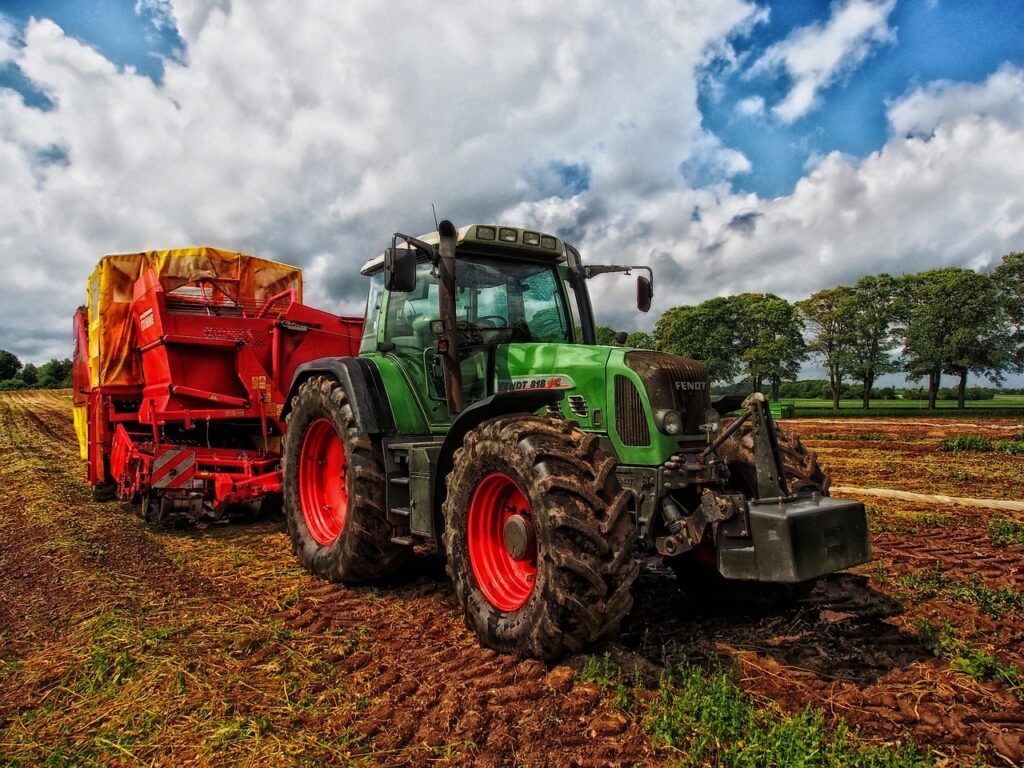Agriculture is the backbone of many economies worldwide, providing food and raw materials for various industries. Agriculture has come a long way from traditional farming methods, with new technologies and practices improving efficiency and productivity. In this article, we will explore some of the latest advancements in agriculture.
One of the most significant advancements in agriculture is the use of precision farming. Precision farming involves using technology to monitor and manage crops and soil conditions. This technology includes sensors, drones, and GPS mapping, which provide farmers with real-time data about their fields. This data helps farmers make more informed decisions about crop planting, fertilization, and irrigation, resulting in higher yields and reduced environmental impact.
Another area of advancement in agriculture is the use of biotechnology. Biotechnology involves using genetic engineering to modify crops to make them more resistant to pests and diseases, as well as to improve their nutritional value. For example, genetically modified (GM) crops like Bt cotton have been developed to produce a toxin that kills cotton bollworms, reducing the need for pesticides.
Organic farming is also an area of growing interest and importance in agriculture. Organic farming involves using natural methods to cultivate crops without the use of synthetic fertilizers or pesticides. Organic farming has been shown to have a positive impact on the environment and human health, as well as providing economic benefits for farmers.
Precision irrigation is another area where technology is making a difference in agriculture. Precision irrigation involves using sensors to monitor soil moisture levels and applying water only when and where it is needed. This approach reduces water waste and improves crop health, resulting in higher yields and lower costs for farmers.
Finally, the use of big data analytics is transforming agriculture. By collecting and analyzing data from sensors, drones, and other sources, farmers can make more informed decisions about crop management, leading to higher yields and improved profitability. Big data analytics also has the potential to revolutionize supply chain management, allowing farmers to better manage their crops and connect with buyers.
In conclusion, agriculture is an ever-evolving industry that continues to benefit from advancements in technology and research. From precision farming to biotechnology, organic farming to precision irrigation, and big data analytics, these advancements are helping farmers to be more efficient, profitable, and sustainable in their operations. With the continued development of new technologies, the future of agriculture looks bright, and we can expect to see even more innovations in the years ahead.


 Bitcoin
Bitcoin  Ethereum
Ethereum  Tether
Tether  XRP
XRP  Lido Staked Ether
Lido Staked Ether  Cardano
Cardano  Dogecoin
Dogecoin  Solana
Solana  TRON
TRON  Polkadot
Polkadot  Toncoin
Toncoin  Litecoin
Litecoin  Shiba Inu
Shiba Inu  Wrapped Bitcoin
Wrapped Bitcoin  Dai
Dai  Bitcoin Cash
Bitcoin Cash  LEO Token
LEO Token  Avalanche
Avalanche  Uniswap
Uniswap  Stellar
Stellar  Chainlink
Chainlink  Binance USD
Binance USD  TrueUSD
TrueUSD  Monero
Monero  OKB
OKB  Ethereum Classic
Ethereum Classic  Cosmos Hub
Cosmos Hub  Hedera
Hedera  Internet Computer
Internet Computer  Quant
Quant  Filecoin
Filecoin  Mantle
Mantle  Lido DAO
Lido DAO  Cronos
Cronos  Aptos
Aptos  Arbitrum
Arbitrum  NEAR Protocol
NEAR Protocol  Optimism
Optimism  Maker
Maker  Rocket Pool ETH
Rocket Pool ETH  Aave
Aave  The Graph
The Graph  WhiteBIT Coin
WhiteBIT Coin  Algorand
Algorand  USDD
USDD  Synthetix Network
Synthetix Network  The Sandbox
The Sandbox  Tezos
Tezos  EOS
EOS  MultiversX
MultiversX  Stacks
Stacks  ImmutableX
ImmutableX  Axie Infinity
Axie Infinity  Rollbit Coin
Rollbit Coin  Theta Network
Theta Network  Bitcoin SV
Bitcoin SV  Injective
Injective  Fantom
Fantom  Decentraland
Decentraland  Radix
Radix  Gate
Gate  FLEX Coin
FLEX Coin  ApeCoin
ApeCoin  Render
Render  Pax Dollar
Pax Dollar  NEO
NEO  Kava
Kava  GALA
GALA  PAX Gold
PAX Gold  Tether Gold
Tether Gold  cETH
cETH  eCash
eCash  Flow
Flow  Rocket Pool
Rocket Pool  Klaytn
Klaytn  THORChain
THORChain  Chiliz
Chiliz  KuCoin
KuCoin  IOTA
IOTA  Casper Network
Casper Network  Sui
Sui  Curve DAO
Curve DAO  Tokenize Xchange
Tokenize Xchange  BitTorrent
BitTorrent  Huobi
Huobi  dYdX
dYdX  Mina Protocol
Mina Protocol  Pepe
Pepe  Terra Luna Classic
Terra Luna Classic  Trust Wallet
Trust Wallet  NEXO
NEXO  GMX
GMX  First Digital USD
First Digital USD  Coinbase Wrapped Staked ETH
Coinbase Wrapped Staked ETH  APENFT
APENFT  Nexus Mutual
Nexus Mutual  Gemini Dollar
Gemini Dollar  WOO Network
WOO Network  Dash
Dash  Liquity USD
Liquity USD  ECOMI
ECOMI  Compound
Compound  Astar
Astar  PancakeSwap
PancakeSwap  cUSDC
cUSDC  MX
MX  Zilliqa
Zilliqa  Arweave
Arweave  Conflux
Conflux  Gnosis
Gnosis  Akash Network
Akash Network  Basic Attention
Basic Attention  1inch
1inch  Chia
Chia  Helium
Helium  OKT Chain
OKT Chain  Illuvium
Illuvium  Enjin Coin
Enjin Coin  Bitcoin Gold
Bitcoin Gold  Sei
Sei  Huobi BTC
Huobi BTC  tomiNet
tomiNet  Osmosis
Osmosis  Escoin
Escoin  Qtum
Qtum  NEM
NEM  Loopring
Loopring  Euro Tether
Euro Tether  Convex Finance
Convex Finance  SingularityNET
SingularityNET  Mask Network
Mask Network  Fetch.ai
Fetch.ai  SafePal
SafePal  Livepeer
Livepeer  Celo
Celo  Zcash
Zcash  Blur
Blur  DeFiChain
DeFiChain  Theta Fuel
Theta Fuel  Decred
Decred  Ethereum Name Service
Ethereum Name Service  Oasis Network
Oasis Network  Aleph Zero
Aleph Zero  Open Exchange Token
Open Exchange Token  Ankr Network
Ankr Network  cDAI
cDAI  Beldex
Beldex  yearn.finance
yearn.finance  Olympus
Olympus  Holo
Holo  JUST
JUST  STEPN
STEPN  eUSD
eUSD  Ravencoin
Ravencoin  cUSDT
cUSDT  WEMIX
WEMIX  Gains Farm
Gains Farm  FLOKI
FLOKI  Kusama
Kusama  Golem
Golem  Alchemix USD
Alchemix USD  BTSE Token
BTSE Token  Baby Doge Coin
Baby Doge Coin  Worldcoin
Worldcoin  JasmyCoin
JasmyCoin  Audius
Audius  SXP
SXP  EthereumPoW
EthereumPoW  Waves
Waves  Balancer
Balancer  DAO Maker
DAO Maker  Terra
Terra  Siacoin
Siacoin  Ribbon Finance
Ribbon Finance  Moonbeam
Moonbeam  Unibot
Unibot  Ontology
Ontology  sETH2
sETH2  Merit Circle
Merit Circle  Band Protocol
Band Protocol  Ronin
Ronin  Ocean Protocol
Ocean Protocol  aelf
aelf  WAX
WAX